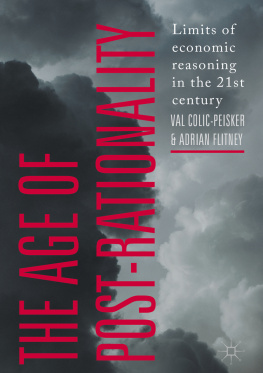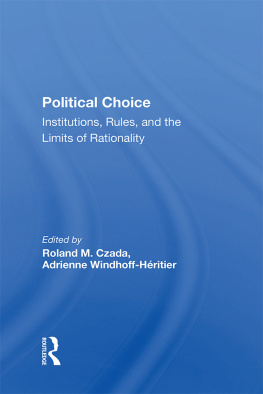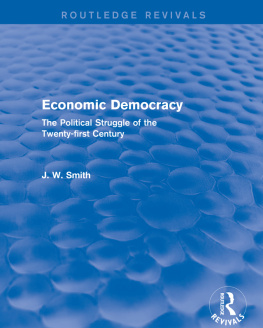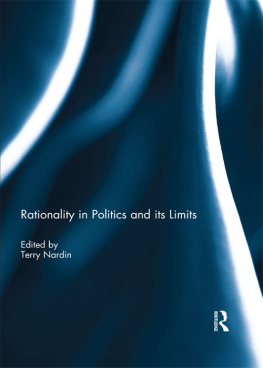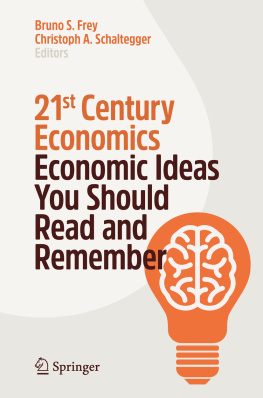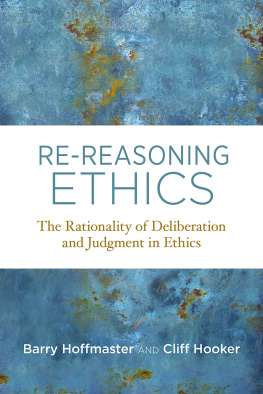In 1992, Bill Clinton campaigned for the American presidency under the slogan Its the economy, stupid. As you know, he won, but you may not be aware than he won against the odds. The slogan was a work of a marketing genius. It outlived the elections and invaded public consciousness. It has been quoted and paraphrased ever since. Politicians take it for granted. The cheeky little phrase took over the world, expressing pithily what had already happened under Thatcher and Reagan over the previous decade. At this point though, in the Anglosphere at least, the left and the right sides of politics converged; both major parties now marched under the its the economy stupid banner. Left-leaning intelligentsia likes to call it neo-liberalism . At the dawn of the Trump era, we are told that neo-liberal globalisation has failed and its victims have raised their collective political fist by electing the loose-cannon president because he promised radical change. However, be sure: whatever Trump does and whichever way he tries to make American great again, he is not going to throw the slogan out of the window. Which is a little ironic, given it is a Clinton slogan.
Rationality Versus Economic (Post)rationality
In this book, we ask whether the unchallenged rule of economic reasoning is a way to a bright future. How did the healthy economysynonymous with the one that grows foreverbecome the pivot of the daily news, indeed the foundation of our social reality? Is it rational that we should always want more, individually and collectively, regardless of how rich we already are? Do all social issues have to be presented in dollars and cents? Do we really need to know how much it costs the economy to beat up ones wife? Does the action against domestic violence really need economic justification (Access Economics ).
In this book, we will argue that economic rationality the cost and benefit analysishas gone beyond its remit, pervaded all areas of life and created a one-dimensional reality. We entered the era of post-rationality. Politicians argue over policies exclusively in dollar terms, sport is about big bucks, art is about art investment, universities are about attracting student-customers and selling them degrees, and working people are human capital or human resources. Ironically, Marxists are often criticised for economic determinism, but neo-liberal s seem to be the extreme devotees of this creed. Such an approach is irrational because (nearly) everyone knows that there is more to life and society than dollars and centseven if politicians and their advisors, almost exclusively economists, argued their economics properly and clearly. Yet, they often retreat to econobabble , a perversion and obfuscation of economic argument presented to justify their decisions while discouraging scrutiny (Denniss ).
If we leave the terrain of economics and look at the broader idea of rationality, it is a difficult concept to define. We have a sense that rationality is a uniquely human characteristic, perhaps central to our humanity. We use the word in everyday discourse, but its precise meaning may vary from person to person and situation to situation. We think we recognise when we, or those around us, act irrationally. Most of us would agree that gambling money away or binge drinking is irrational. Yet, bars and bottle shops, gambling dens and shiny casinos are economically rational enterprises that live off peoples irrational behaviour.
An everyday, common-sense meaning implies that rational behaviour is to ones advantage, and irrational to ones detriment. However, further questions instantly haunt this simple understanding. Our behaviour affects others, so an advantage for whom, us or the others? Certain behaviours can be advantageous, and therefore rational to an individual, a business, a family, a community, a nation, but detrimental to outsiders. What about humanity as a whole, including future generations, as in warming up the planet for the sake of short-term rational economic goals? How do we reconcile local and global rationality, the rationality of short- and long-term goals? We can also ask what constitutes our ultimate advantage, or rational goal. Is it a pursuit of pleasure or happiness? Accumulating wealth? Leading a meaningful life? Or something else? And of course what is happiness or fulfilment is another million dollar question. Rationality is a complex concept; in this book, we step down from the most abstract, philosophical level and analyse it through several case studies highly relevant for the society here and now.
In his seminal 1945 book The Open Society and Its Enemies , Karl Popper () argued that the readiness to listen to a critical argument and to learn from experience was the primary tenet of rationality. He defined rationality as fundamentally an attitude of admitting that I may be wrong and you may be right, and by an effort, we may get nearer to the truth (p. 225, emphasis in the original). During the eighteenth and nineteenth centuries, when the West shed the last vestiges of theocracy and the secular elite dismissed God as the final arbiter of human affairs, human judgement was recognised as relative. In this context, Popper emphasised the social character of rationality; a particular type of rationality to which a society or an era adheres should be continuously tested through democratic debate.
There is an even broader meaning of rationality: an action is rational if the actor conceives a rationale (purpose, reason) and a (however basic) plan or method to achieve this purpose. We are able to define our goals, including long-term ones, and devise the means of achieving them. This is instrumental rationality. Given the social nature of human existence, the purpose needs to appear reasonable to othersespecially our significant others. What is considered rational is dependent on social context, time and place. Consequently, an everyday meaning of rationality can be stretched almost endlessly. A rational purpose of ones action, as well as the most efficient method to execute it may have myriad variations, as well as a posteriori interpretations.
Arguably, the broadest as well as most fundamental meaning of rationality points to our individual and social survival. Actions, habits and behaviours that are likely to prolong our individual life are considered rational; the same applies to the survival of human groups and the human species itself. Following Descartes , we can start with the one essential condition of any deliberation, the existence of the thinking person: Cogito ergo sum . Therefore, the primary rational goal we should be able to agree upon is our collective survival. This point of consensus can serve as a basis in defining rationality as a social issue.
This book started from the need to have a close look at the rationality of the society we live in. Our desire to explore the topic was triggered by daily news and current affairs, and particularly by the global warming debate. The wrangling over whether climate change is anthropogenic or not should be a rational debate grounded in science and based on evidence, but it has degenerated into a quasi-religious tug of war between believers and sceptics. Even more importantly, because its the economy, stupid , we seem happy to sizzle and freeze, drown and burn, due to an increasingly extreme climate in order not to hurt the economic bottom line. Is this rational? Has the world gone crazy? Many middle-aged people have asked this question before us. But we do believe it is not just our mid-life crisis that led us to write this book.

